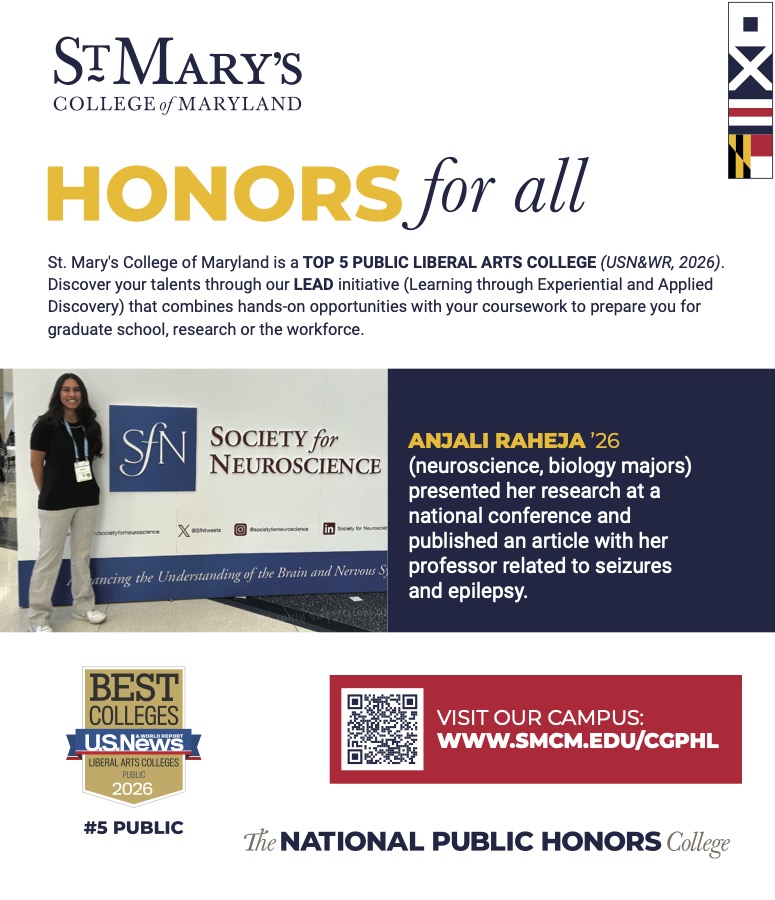The Continued Relevance of a College Education
- St. Mary's College of Maryland

- Oct 8, 2025
- 3 min read
By Rhonda G. Phillips, Ph.D., FAICP
Many people view a college education as transactional-i.e., what job will this degree train me to perform? While that is a valid question, at its heart, a liberal arts and sciences education is an education for a lifetime, not just for a profession. Liberal arts colleges – particularly honors colleges like St. Mary’s College of Maryland – use the study of history, literature, art, social science and physical sciences to develop more than technical skills and knowledge in those fields. Through study and exploration, our graduates are adaptive, flexible thinkers with skills in problem solving, communication, research and collaboration that carry them through a lifetime.
Today, our increasingly technical, interconnected and competitive world demands certain skills right out of the gate for college graduates. St. Mary’s College of Maryland has developed a distinctive initiative that we call LEAD – Learning through Experiential and Applied Discovery. Through LEAD, our students receive practical hands-on skills and career-focused training and internships that make them competitive in the workforce or graduate and professional school from day one. Another aspect that I wish was more understood: there’s a secret about the “liberal” in liberal arts – from its Latin roots, its meaning is “free” – in other words, free to explore, learn and create. With the rapid evolution of the AI age, we need even more innovative and creative ways of thinking which a liberal arts and sciences education fosters.
America’s colleges and universities have a role to play in reversing the fraying civic bonds that threaten our democracy. While college graduates comprise a minority of American adults, they occupy key positions in our society with potential to guide and direct the rest of us – teachers, community and corporate leaders, scientists, doctors, lawyers along with politicians and elected officials. Ultimately, the classroom is our shared experience that brings together diverse groups to achieve educational goals.
St. Mary’s College of Maryland, founded in 1840 as a living monument to the establishment of our state and the foundation of religious liberty in America, is uniquely positioned in this regard. Our abiding philosophy – the St. Mary’s Way – charges every member of our community to accept the responsibility of helping to build on those founding ideals to contribute to our shared future. We were recently ranked #2 by the Princeton Review among public colleges for our students’ ability for making an impact – this is a reflection for the opportunity students have for engaging with their community, contributing to a sustainable campus and participating in student governance. Our graduates carry these values with them.
The higher education sector needs to strengthen community engagement efforts, and that starts with doing a better job of messaging the benefits of a college degree. These benefits at the individual and family level include fostering economic mobility and improving well-being that in turns enables stronger communities. Higher education in America contributes billions of dollars to society in many tangible ways – through research and development, direct economic investment, the arts, entertainment and positive community and economic development outcomes. Through our faculty expertise and state-of-the-art facilities, we leverage billions more in grant funding to support these efforts – all of which benefits society as a whole. The growth trajectory of this nation could not have been realized without the advent of accessible and affordable education; think about the assets created by the sector which is comprised of thousands of small to large public and private institutions. The unprecedented rise of the US as a mighty global economic force, especially throughout the 20th century, is directly linked to post-secondary education accessibility.
At St. Mary’s College of Maryland, we contribute to these efforts locally and regionally. Through our partnerships with organizations like the St. Mary’s River Watershed Association, our student and faculty researchers contribute to monitoring and restoring the ecological health of the Chesapeake Bay. Another example includes graduates from our Master of Arts in Teaching program become teachers in our schools (and are frequent recipients of teacher-of-the-year and other accolades).

St. Mary’s College of Maryland offers students an honors-level liberal arts and sciences education on par with the nation’s renowned private liberal arts institutions, but with public college access and affordability. In so doing, we have an immediate impact on our region and state with our graduates carrying forward their learning experience as contributing citizens throughout the nation and world. All of us in this sector, along with those holding college degrees, need to help message the value of higher education and the ability it provides for moving forward, both individually and in our communities, states and nation.
Rhonda G. Phillips, Ph.D., FAICP, is the 8th President, St. Mary’s College of Maryland




